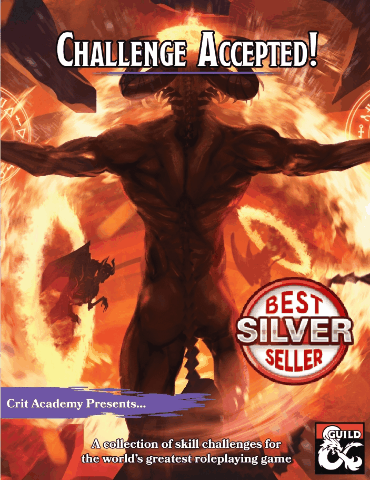Types of Puzzles
- Justin Handlin

- Mar 30, 2020
- 5 min read

We can all agree that puzzles play a critical role in the Dungeons and Dragons multiverse. These complex scenarios are often somethings adventurers need to work through in order to delve deeper into a dungeon, either to unlock a magically sealed door, or by pass the mysterious guardian sphinx. In either case, part of the roleplaying experience is the solving of puzzles. In this episode Crit Academy discusses the multitude of different styles of puzzles that can be used to enhance your D&D experience.
Main Topic: Types of Puzzles
Riddles:
Greek legends of Sphinx most illustrious – Basically a series of clues couched in obscure language.
Solving such puzzles is a matter of understanding the less obvious meanings.
Example:
In daytime I lie pooled about,
At night I cloak like mist.
I creep inside shut boxes and
Inside your tightened fist.
You see me best when you can’t see,
For I do not exist.
Play on words and metaphor conceal the answer; darkness
Cryptograms:
Written word puzzles in which the letters are placed with other letters or symbols.
Easiest format uses pattern of substitution, for example using the next letter in an alphabet
More difficult formats include matching letters or symbols randomly
Pg 122 thru 124 in the PHB has alphabets of both dwarvish, draconic and elvish available to the players
Word Searches:
Grids of letters that conceal words written in different directions
Give the players a list of words to find
These words can be themed, such as names of gemstones, spells, or weapon and armor
Maybe they need to find which gemstones go into a recessed area seal
These can also conceal a message
Arranging and reading the words that are found into a structured statement
Crossword Puzzles:
Crisscross puzzles, the goal is to fit all the words form a list into a provided grid of crossing lines
This can hide messages spelled out by shaded squares in the grid
A fully crossed puzzle is better as an obstacle the characters must solve to get past
Variant: Number Grid:
In place of numbers use distinct symbols, colored gems, coins or other items
Given a few symbols already placed, the objective is simple
Fill in the grid that each symbol occurs exactly once in each row, once in a column and once each subsection (typical 9x9 grid with 3x3 sub sections)
Logic Puzzles:
Players figure out the answer using clues to winnow down to a single answer, example;
Emperor Darvan the Mad had three sons. The oldest, Fieran, was killed by his brother’s hand. Madrash knew no fury. Delvan was the youngest.
The three sons wielded three legendary swords, which were buried with them. Fury’s Heart was never touched by a righteous hand. Night’s Embrace was untainted by royal blood. Death’s Chill slew the orc chieftain Ghash Aruk.
Having learned that much, the adventurers now stand in the antechamber before the crypts of the three brothers and read the inscriptions on their doors.
The Crypt of the Disgraced holds the son who murdered his brother. The Crypt of the Innocent holds the blameless son who died of old age. The crypt of the Righteous, undimmed by night, holds the paladin son.
The characters need to determine which son and which sword lie in the Crypt of the Disgraced.
Labyrinth:
Classic puzzles, made popular by Greek legend of Daedalus and the minotaur – twisting and turning corridors designed to confuse and get those inside lost.
Use with caution – just describing turns and dead ends isn’t fun
Spice up with traps and monsters to create effective puzzle
What is it’s purpose? Lock something in? keep something safe from intruders or just a trap to keep intruders from escaping?
When using skill checks you can describe failed attempts repeatedly to give them a notion they may be lost – such as non-random claw marks they pass repeatedly
Unearthed Tips and Tricks: New and reusable D&D content for you to bring with you on your next adventure.
Character Concept: Lost Power
This character claims they were once a deity
Their power was stripped from them by another
Now reduced to a puny mortal, they strive to reclaim what was taken
Seeks revenge for those who are responsible for casting them out
Monster Variant: Amphibulette
Origin: Bulette
Features:
Amphibious. The creature can breathe air and water.
Swim. This creature has a swim speed of 30ft.
Swallow. This creature makes one bite attack against a medium or smaller target it is grappling. If the attack hits, the target is swallowed, and the grapple ends. The swallowed target is blinded and restrained, it has total cover against attacks and other effects outside the Amphibulette, and it takes 5d6 acid damage at the start of each of the Amphibulette’s turns. The Amphibuleete can have only one target swallowed at a time.
If the Amphibulette dies, a swallowed creature is no longer restrained by it and can escape from the corpse using 10 feet of movement, exiting prone.
Encounter: Elemental Whirlpool
Fisherman and smaller merchant vessels are disappearing.
Heroes challenged with finding out what is happening.
A whirlpool has been sucking boats into the watering coffin.
The cause of the whirlpool is a water elemental near it’s center.
The elemental broke its summoners chains(control)
It has claimed the territory as it’s home and deals with any intruders.
Magic Item: Aetheryte Stone!
This light blue diamond shaped stone has a pulsing light radiating from the inside. Intricate runes are engraved all around it. A light thrumming can be heard resonating from its center.
When you stand near a permanent teleportation circle and attune to this item and learn the sigil sequence of magical runes unique to that circle. This stone allows you to can cast the Teleportation Circle Spell. The spell can ONLY take you to the permanent teleportation circle where it was attuned to.
You may not attune the Aetheryte Stone to more than one permanent teleportation circle at any given time.
Once used, it cannot be used again until the dawn of a tenday.
Dungeon Master Tip: Sap their Vitality!
Grueling trek across hostile terrain such as Deserts, hail storm, blizzard and such forces con saves– failure means loss of Hit Die
The loss of hit die represents the strain on the characters’ overall vitality
These don’t often return until they’ve reached a much more hospitable environment.
Player Tip: Don’t be a dick!
Define the Situation! Is it Grossly unfair?
If your party is battling on the edge of a cliff side fighting rocs, harpies or some other winged beasts, back off.
Evaluate the situation and decide if there is any action you can take to make it more of a fair fight.
In this situation snip their wings Or find a way to give yourself wings
Otherwise they will throw your ass off the edge to your death.
If you have any feedback, unearthed tips and tricks or topics you would like us to discuss, please send them to us. You can email them to us at critacademy@gmail.com or find us on twitter and facebook @critacademy.
We hope you’ve enjoyed your experience here at Crit Academy. If you did, you can help others find the show by leaving a hopefully 5 star review on itunes. Or just send us a message telling us how much you enjoy the show
Also be sure to give us a like and a share!
Make sure to subscribe to our show at www.critacademy.com, follow us on Twitch and Youtube so we can help you on your future adventures as well as a chance to win cool prizes each and every week. Make sure to check out our fellowship members as well.
Keep your blades sharp and spells prepared heroes!















Comments